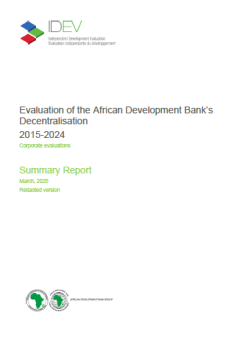
Evaluation of the African Development Bank’s Decentralisation (2015-2024)
The evaluation found that the Bank’s decentralisation efforts were largely aligned with its strategies, commitments and client needs, for enhancing proximity, project design and supervision, and stakeholder relationships. However, these efforts were only partially responsive to the needs of countries without local offices, including transition and small island states. Gaps were noted in the design quality and monitoring and evaluation frameworks.
The effectiveness of the AfDB’s decentralisation efforts revealed a mixed picture. The evaluation found that while the AfDB implemented most UDAP actions, only 53% of outcome targets were achieved. These efforts contributed to strengthening local presence, improving resource mobilisation and portfolio growth, enhancing stakeholder coordination, and increasing policy engagement. Evidence also showed that on-site Task Managers improved project performance at completion. However, persistent country-level capacity and institutional challenges suggest that decentralisation alone is insufficient to drive project effectiveness and efficiency. The evaluation noted persistent challenges, particularly regarding gaps in delegation of authority and staffing, insufficient financial resources, and structures and processes that continue to hinder performance. In conclusion, the decentralisation benefits are likely to be sustainable, but long-term success is threatened by staffing challenges, communication gaps, and delayed or non-implementation of human resource reforms.
Key lessons include the need for a comprehensive strategic framework and monitoring and evaluation system, adequate staff availability and expertise, setting realistic timelines, and ensuring adaptability and cross-level collaboration.
The report recommends strengthening the strategic direction, organisational structures, processes, resource capacity, communication and engagement to enhance ownership, efficiency, and the long-term development impact of the Bank’s decentralisation efforts
